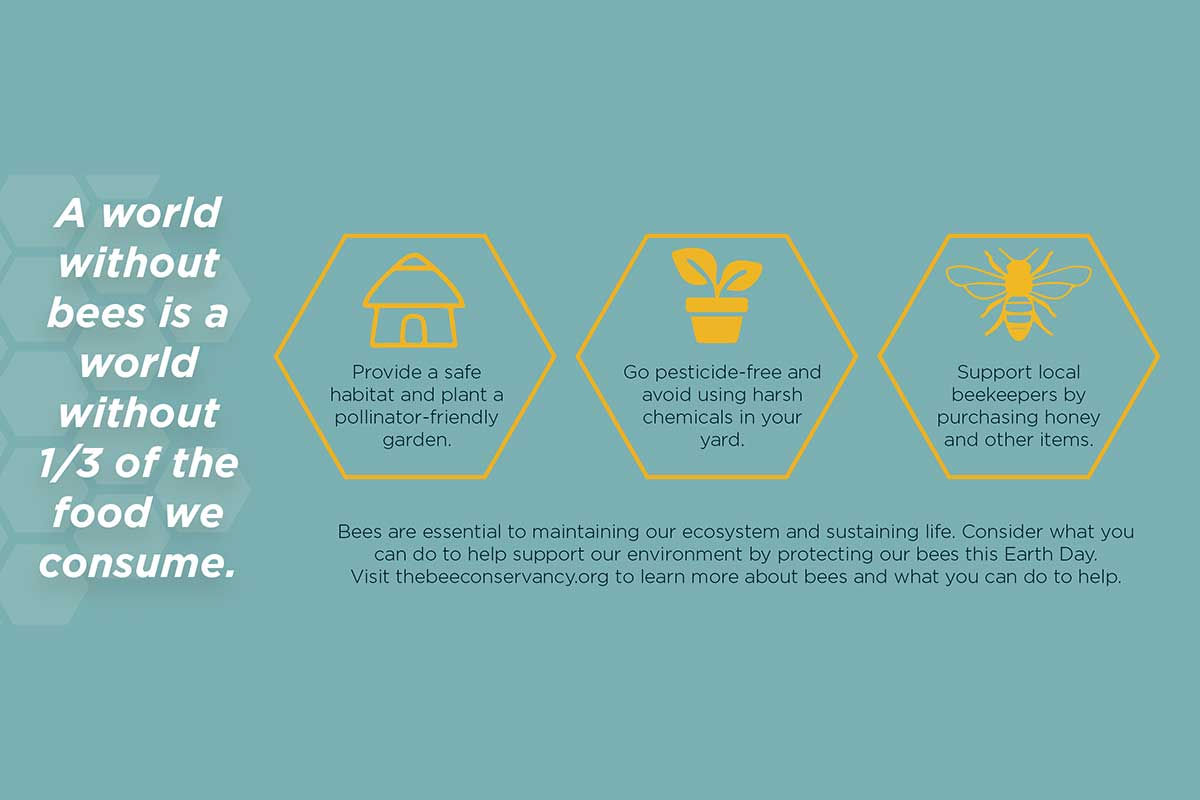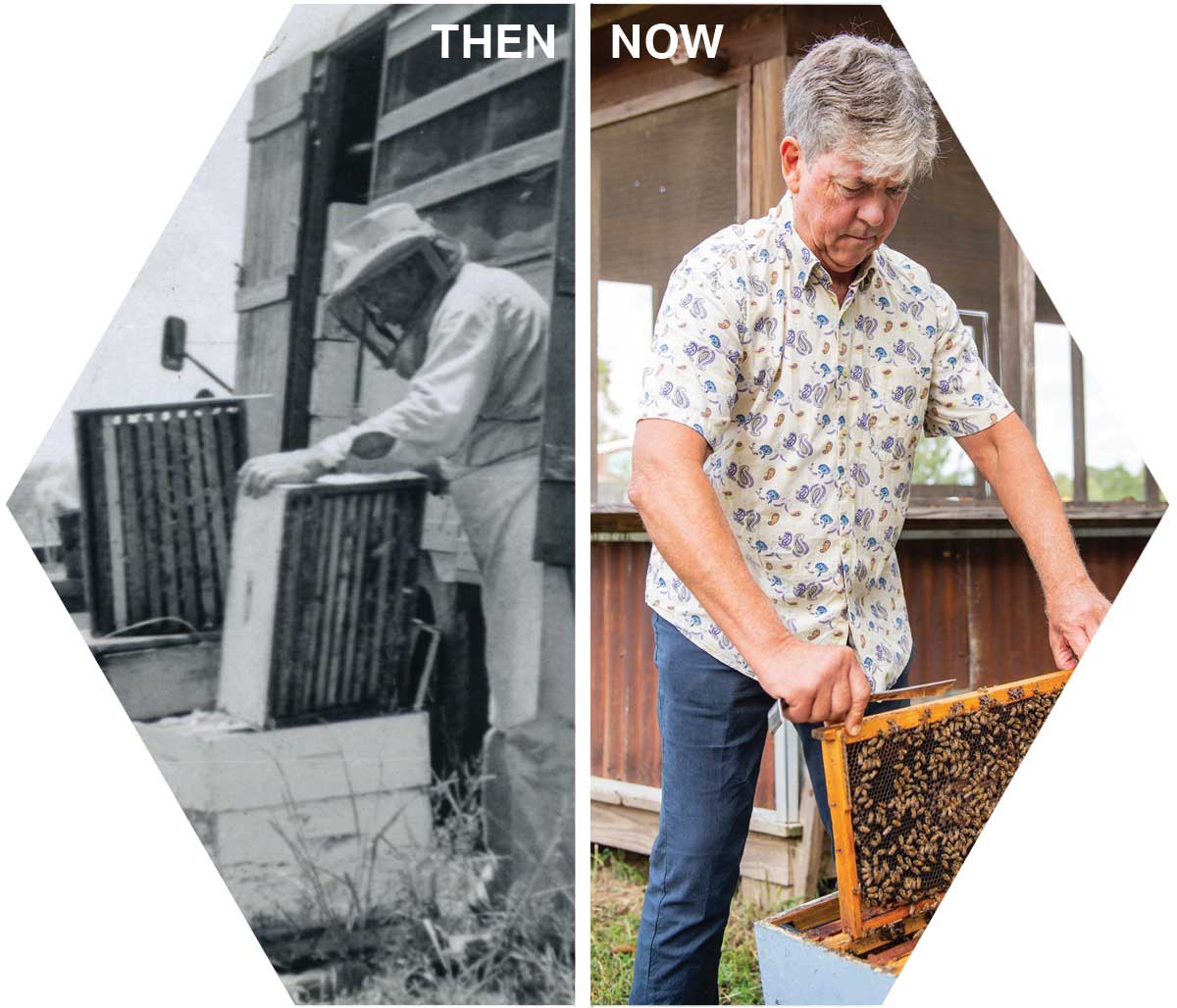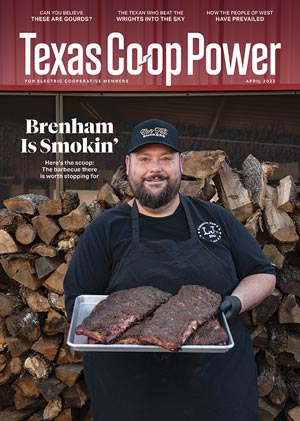BeeWeaver welcomes visitors from across the nation to its little patch of heaven. The 135-year-old honey farm holds deep roots in the small community of Lynn Grove, a short drive from Navasota. For many years, most visitors were fellow beekeepers coming to purchase new hives and stock up on apiary equipment. However, additions to the farm in the last decade have made the operation a popular tourist attraction.
Fifth-generation beekeeper Dan Weaver and his wife, Laura, manage the family business and bring fresh ideas to help make their operation one of a kind. Laura, affectionately known as the Queen Bee by employees and returning guests, began helping on the farm when she met Dan. Once they married, Laura put her own spin on the operation.
“I majored in education,” Laura Weaver says. “After working with Dan on the farm, I wanted to take what I had learned and share these angels of agriculture with others. That’s just the teacher in me.”
The BeeGoods Mercantile, added to the property in 2016, was the Weavers’ first venture into agritourism. Before its addition, curious passersby would stop with questions about the BeeWeaver farm.
“We either had to put up a fence with a giant gate or welcome them in,” the Queen Bee jokes. “There’s no one out there doing what we’re doing.”
Weaver says the new generation continues to improve bee genetics, a project Dan started with his grandfather, but also provides visitors with an educational experience. “We want to give people the chance to encounter bees in a way they’ve never experienced before.”
Schedule a honey tasting, watch beekeepers harvest honey from the observation deck, order a honey-infused dish from Fly-By Sip ‘n Snack and enjoy a flight of honeywine from Wildflyer Meadery during your visit. Stop any member of the B-team—BeeWeaver’s talented team of beekeepers and operations staff—and learn more about the world’s most important pollinators while you’re there.
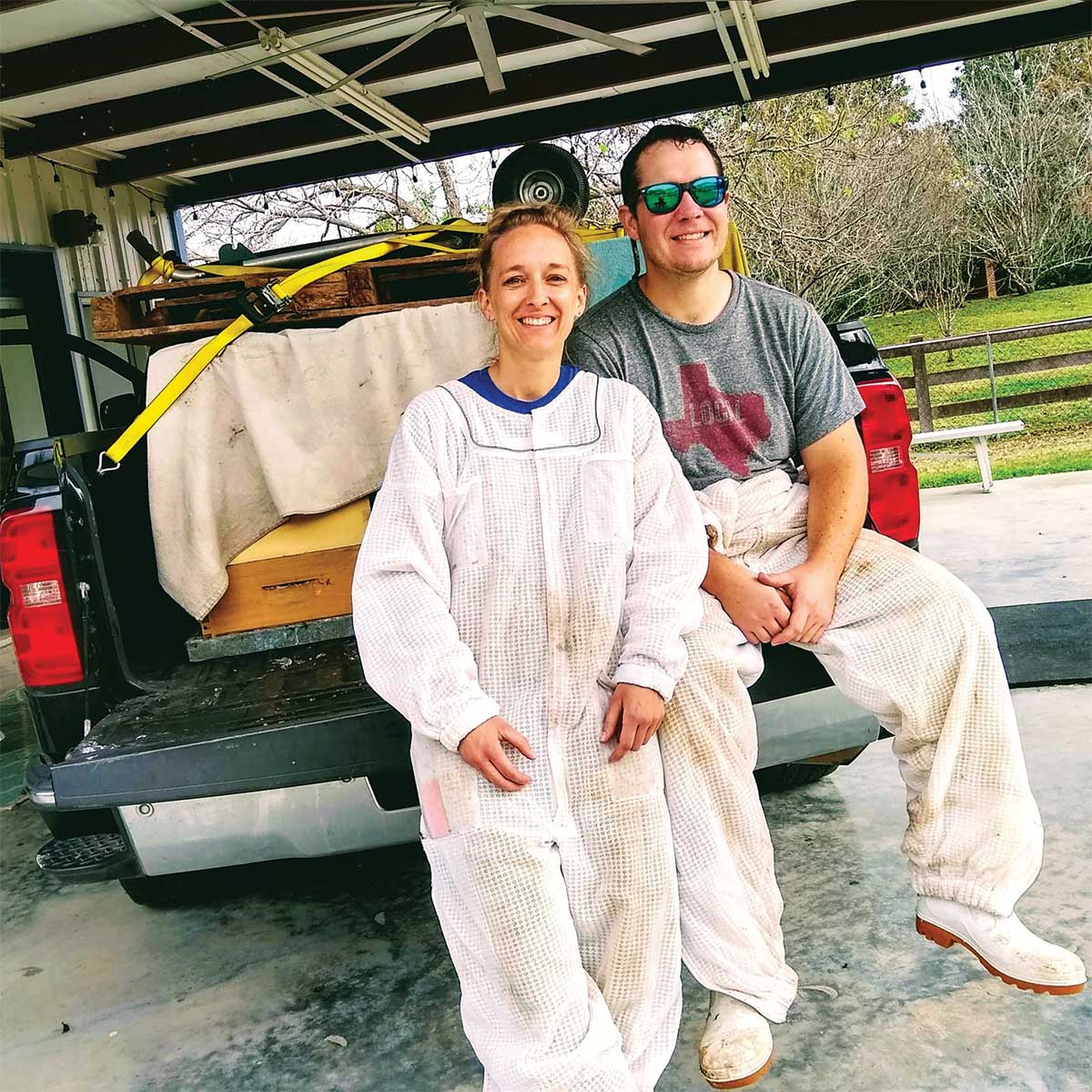
Jeff, right, and Chelsea Murray smile after a day with the bees.
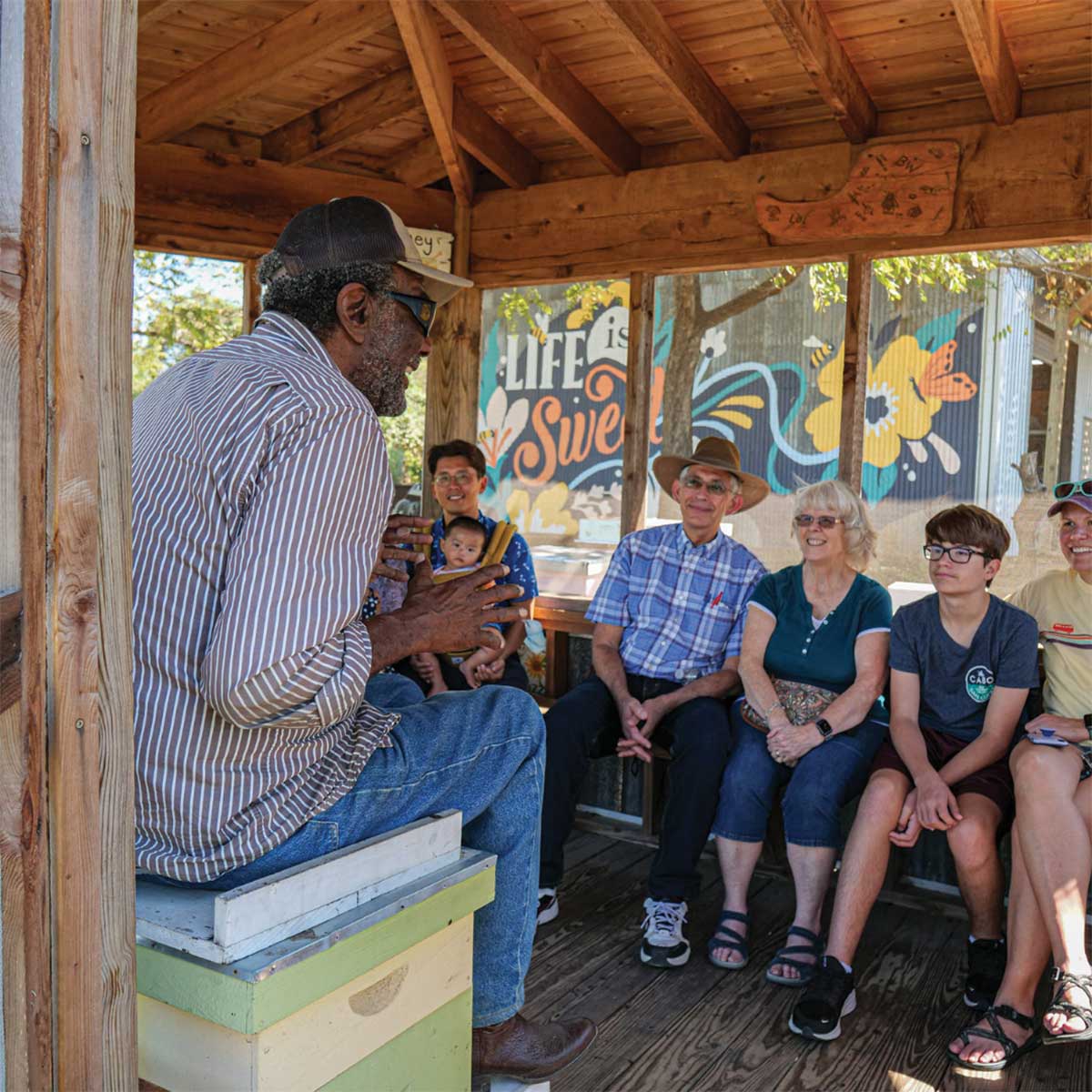
Visitors learn more about pollinators at the observation deck.
Guests can make a weekend of it and reserve on-site overnight accommodations. In addition to RV hookups, BeeWeaver offers an urban loft, renovated schoolhouse and four glamping tents (don’t worry, they’re equipped with AC!) to accommodate extended stays.
Making Life Sweeter Since 1888
Members of the Weaver family have been beekeepers for over a century. In 1888, Florence and Zachariah Weaver received 10 bee colonies as a wedding gift. The couple’s determination and eventual passion was passed down through four more generations of Weavers, each with the goal of producing quality bees and honey.
After decades of marketing queens, colonies and honey worldwide, Binford and Dan Weaver challenged themselves with a dream that would split Weaver Apiaries into two companies—R Weaver Apiaries and BeeWeaver Honey Farm.
In 1994, the grandson and great-great-grandson of Florence and Zachariah Weaver began a selective breeding program to create a more resilient bee under the BeeWeaver name. They added another breed to their portfolio and stopped treating their hives with pesticides and chemicals. The five surviving colonies became the backbone of BeeWeaver’s current 3,000 mother colonies.
It took the duo a few years to achieve their own hybrid bee breed. Since 2000, BeeWeaver has been recognized for its disease-resistant and mite-tolerant pollinators.
Binford and Dan’s endeavors faced a unique challenge. Their experiment began just as Africanized bees reached the Lone Star State from South America. The aggression of this invasive species invoked a new and raw fear of bees among neighbors.
“We had yards vandalized, burned and run over with trucks,” Weaver says. “People were just scared and didn’t know a lot about bees.”
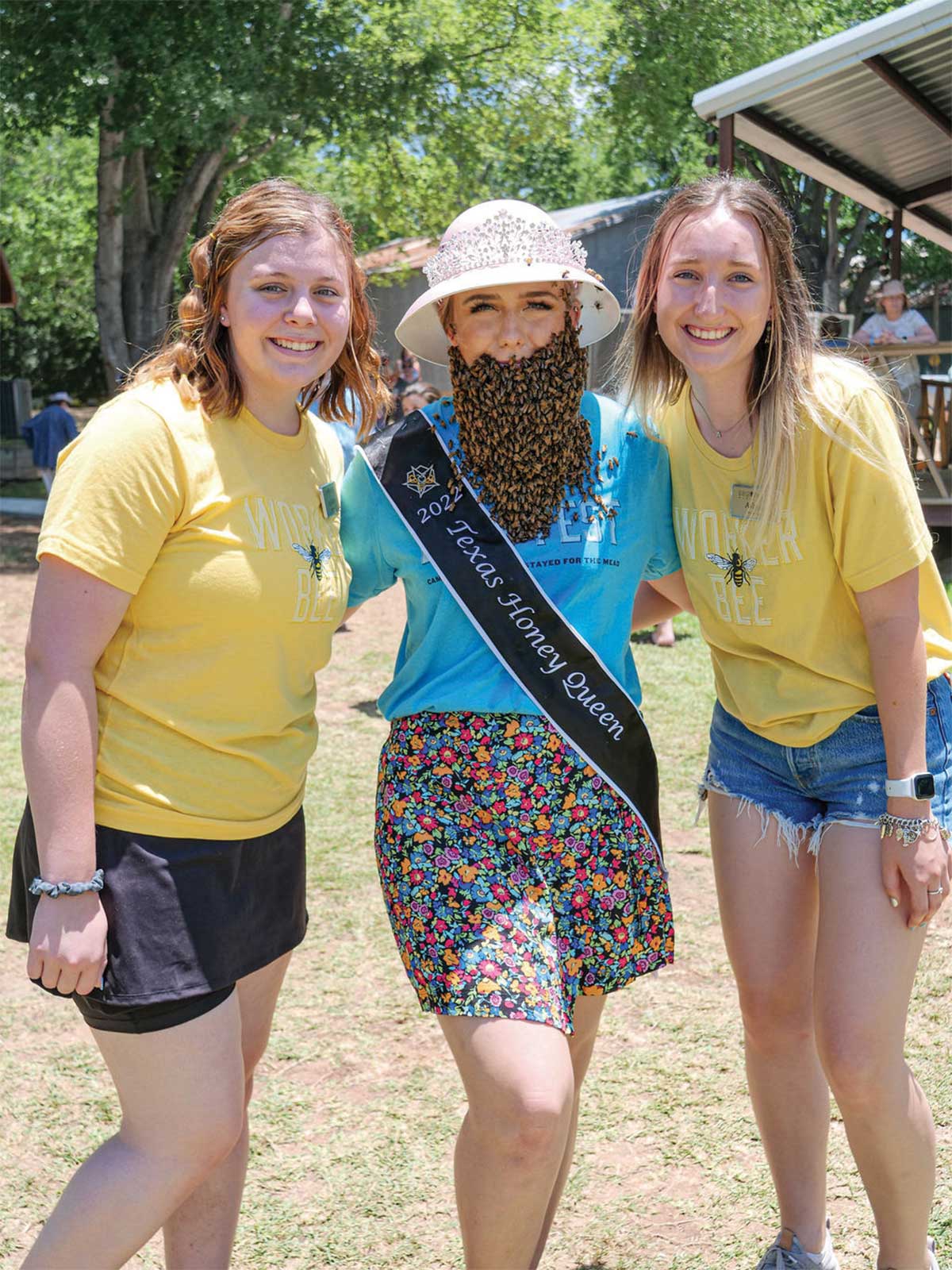
The Texas Honey Queen poses with other worker bees at Buzzfest.
The foreign species that infiltrated Texas hives played a key part in the Weavers’ success. “Those same genetics known for their defensiveness helped us get chemical free,” Weaver says. The Africanized bees had decades of contact with mites and were naturally tolerant—the very thing BeeWeaver was working toward.
In 2001, after reaching their pesticide-free goal, the Weaver family quickly adjusted focus to begin breeding for calmer hives. Today, Dan and Laura now produce insects renowned for their docility. Laura is notorious for keeping her hives in high-traffic areas like her front porch or near pets, guests and children. Each spring, beekeepers invest in their own programs by purchasing BeeWeaver queens, nucs and bee packages. A Need for Mead
Piggybacking off the mercantile’s success, the Weavers began looking for new avenues to provide bee-inspired products. Laura, determined to share all the good bees create, began to chase another dream—mead, often referred to as honeywine.
As Weaver was inexperienced in this venture, several hurdles stood in her way. The farm sat smack in the middle of an unknown dry portion of the county and she didn’t even like mead … yet.
Weaver needed the alcohol restriction lifted for BeeWeaver to sell honeywine. She posted to Facebook asking others to rally together for the 700 signatures needed to remove the restriction on her rural precinct in Grimes County.
Friends and fellow beekeepers had gifted Laura mead for 30 years but she hadn’t found one she fancied. “To be honest, it wasn’t quite my jam,” Weaver says. “They were all too sweet, but I wanted to like it because it was made from honey.”
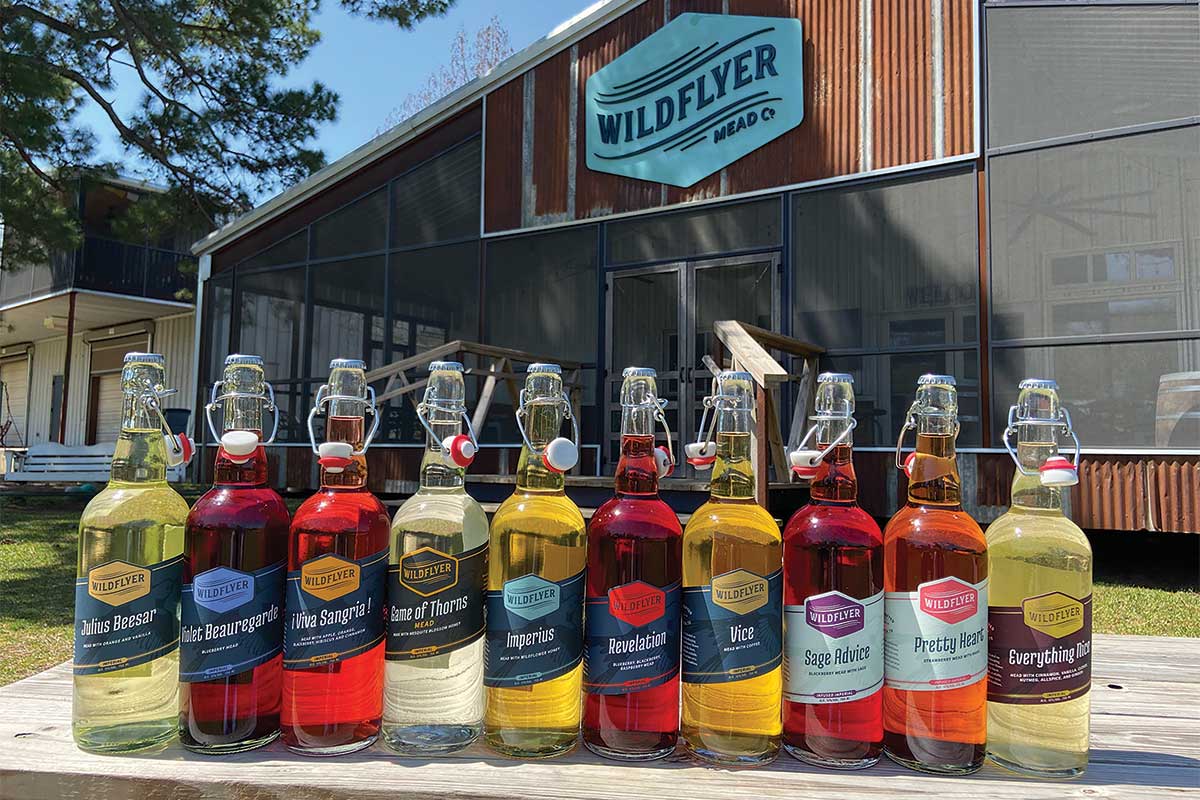
Colorful bottles of Wildflyer mead.
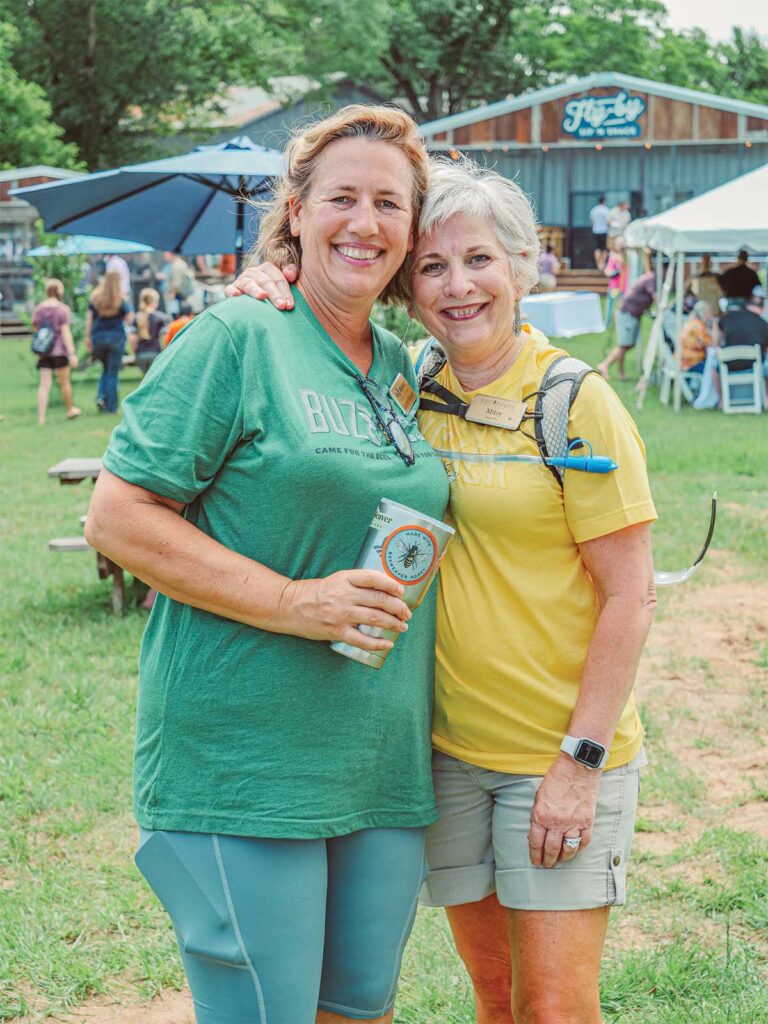
Queen Bee Laura Weaver, left, with one of her B team members.
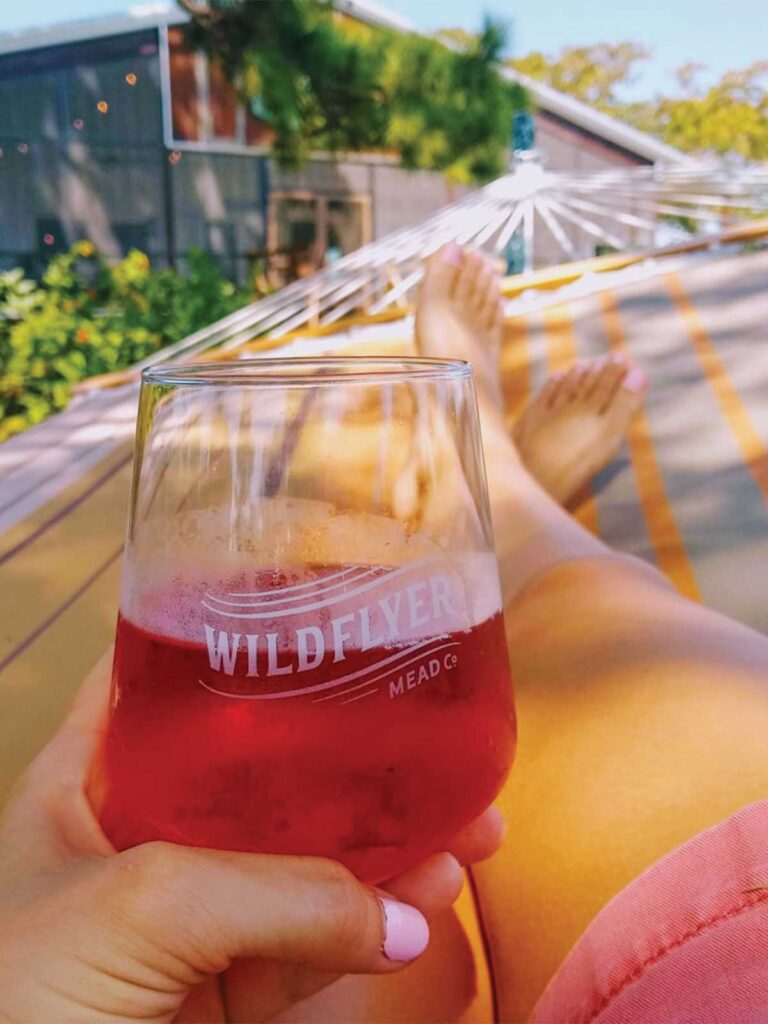
Quench your thirst with a glass of mead.
Enter Jeff and Chelsea Murray. Scrolling her social feed one night, Chelsea stumbled on Laura’s rally post and reached out. The Murrays were making mead in their home kitchen with the dreams of opening their own meadery and wanted to see if the Weavers were interested in a partnership.
“Jeff and Chelsea came out to the farm. He had bottled different flavors in tiny Coke bottles,” Laura says. “His [mead] was bubbly and light. By the time I got to the third bottle I was like ‘That’s it! We’re done.’ That was the beginning.”
Jeff and his wife, the friendly faces you see behind the bar at Wildflyer, lived in Alaska for four years after graduating from Texas A&M University. When they moved back to Texas in 2011, they picked up beer homebrewing as a hobby. In 2014, the couple purchased their first set of bees—from BeeWeaver, no surprise. Honey making and mead quickly followed.
The Murrays dreamed of their own business when they met the Weavers. It was the perfect scenario. BeeWeaver could provide the honey and Jeff could make the mead. The team started Wildflyer in 2019 and hosted its grand opening on Valentine’s weekend of 2020.
“We were open for six weeks before pandemic restrictions required to-go sales only,” Jeff remembers. “It was scary and nerve-wracking.”
The pandemic threatened the success of the growing business, and yet it thrived. Timing of the shutdown aligned perfectly with BeeWeaver’s busy season. When the world didn’t know what to do, people turned to outdoor hobbies—beekeeping included. As beekeepers and aspiring hobbyists made their way to the farm, they also picked up Wildflyer mead to take home.
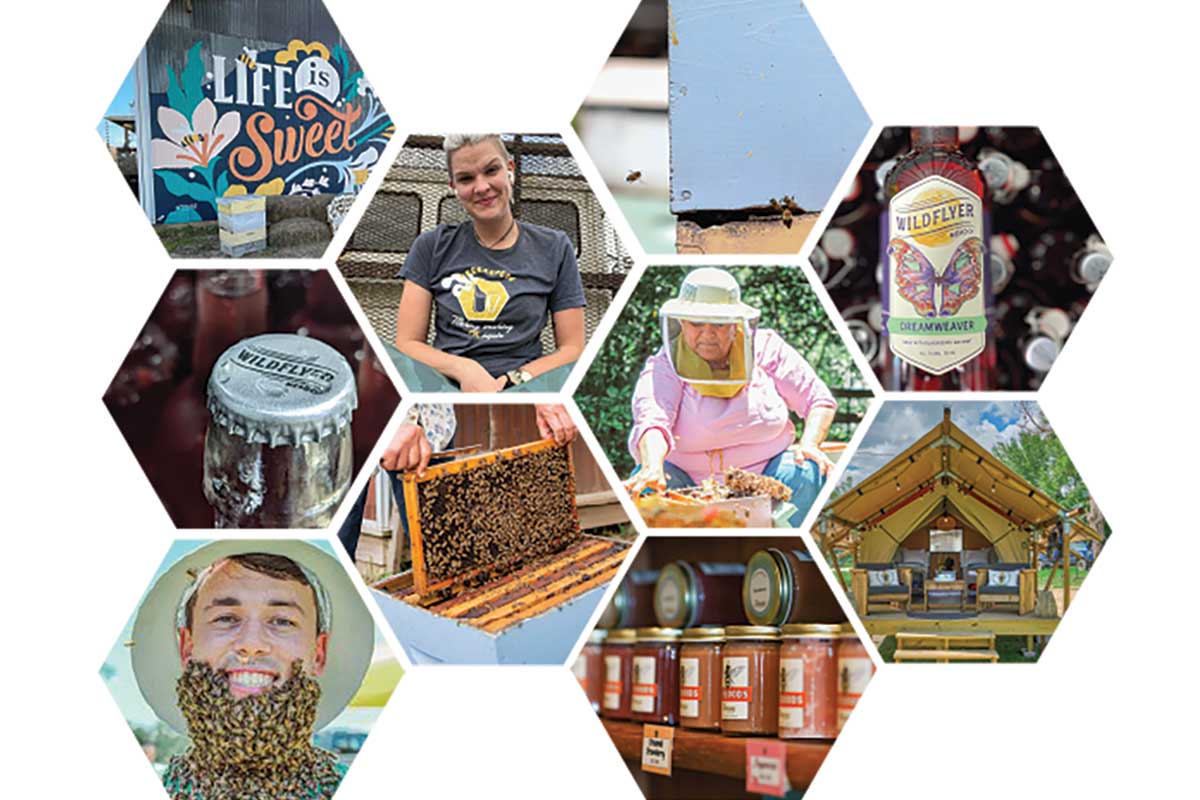
In September 2020, Jeff left his gig in the oil and gas industry to pursue his passion full time. “I never thought I’d be doing this,” he says about leaving the security of working for the man and pursuing entrepreneurship. “They were making us go back into the office and I decided I wasn’t.”
Wildflyer mead is a honey-based wine infused with various combinations of fruits and spices. Jeff uses local honey and whole fresh fruit for all his recipes. “I can tell you who the beekeeper is for all the honey we use, where it’s from and how it’s treated. I’m really proud of the ingredients and the love and care we put into making our meads.”
Jeff draws inspiration from all over when making his meads. He gathers ideas from the wine aisles of H-E-B or even his favorite Sonic drink. Wildflyer meads use citrus to create an acidic background, similar to a pinot grigio wine. Coupled with a slight carbonation, the complexity and brightness make the drink enjoyable year-round.
“With as hot as it is here, I want it to be something people can drink outside,” Jeff says. “I want it to be approachable. I want it to be light.”
Fan favorites include Hot and Bothered—a jalapeño-infused concoction. Jeff jokes it may be the most popular and least popular mead on their menu, but he loves the reaction it gets from guests. Marooned, named after Jeff’s alma mater, is a good introductory mead for first-time visitors.
Each gallon of Jeff’s honeywine requires up to 3.5 pounds of honey and 5 pounds of fruit. The meadmaker initially wanted Wildflyer to solely use BeeWeaver honey in his
recipes but quickly realized it wasn’t feasible. “As we’ve grown, we’ve outpaced their honey production. You have to remember, honey is more of a byproduct for them,” Jeff says.
The families run two businesses together in one space. “I couldn’t ask for better partners,” Weaver says. “I’ve had friends notice the groups of young adults coming to experience bees and having fun. That has a lot to do with Wildflyer,” Weaver says.
Both businesses host a variety of events throughout the year. Depending on when you visit, you may see an elusive bee beard. No matter the time, there’s always plenty to do.
